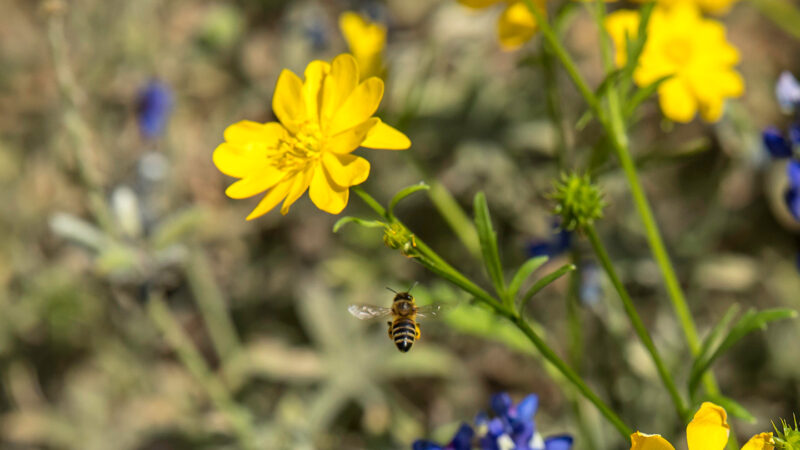Flowers may electrically detect bees buzzing nearby

Flowers may have a secret power for luring in pollinators.
New research suggests that plants can pick up electrical signals sent out by bees. Those signals may help plants time their nectar production to when the pollinators are near. Plants also may share those signals with each other through the soil.
Daniel Robert shared these results March 6 at the American Physical Society meeting. It was held in Minneapolis, Minn. Robert is a biophysicist at the University of Bristol in England.
Researchers have long thought that plants might use electricity to communicate. That would allow them to share information faster than if they used chemicals, Robert says. But just how that electrical signaling might work remains a puzzle.
In the past, Robert was part of a team that found bumblebees carry a positive electric charge. Plant stems have a negative charge. What’s more, petunia stems become more charged as a bee approaches. Their blooms also produce stronger scents when a bee is nearby. This hints that plants can detect pollinators without being touched by them. They just sense the insects’ electrical signals.
Electric detection
In the new study, Robert’s team designed antennas that gave off specific electrical signals. These signals mimicked ones produced by a bee’s wings flapping in an electric field. Such fields exist in nature thanks to the electric charges of flowers, bees and Earth’s atmosphere.
The antennas were placed above daffodils growing in the lab. The team also put metal electrodes on the flowers’ stems. Those electrodes measured changes in voltage at the stems’ surface. That told the researchers whether the plants reacted to the antennas’ bee-like signals.
Daffodils, it seemed, could pick up electrical signals from the antennas without touching them.
Explainer: Understanding electricity
Would changing the flower’s shape disrupt the signal, Robert’s team wondered? Daffodils have a crown-like blossom, or trumpet, at its center. This is surrounded by other petals. When the researchers removed the trumpet or other petals, the plant could not pick up the bee-like signal as well.
The researchers then put electrodes on hogweed plants and buttercups in the University of Bristol’s outdoor gardens. Once again, the team mimicked sending bees’ electrical signals above a row of these flowers. Nearby flowers in the same soil also wore electrodes. But those plants were covered with a metal shield. That shield blocked electrical or chemical signals in the air from reaching those plants.
Surprisingly, electrodes on the shielded plants still detected electrical signals. This hinted that the plants exposed to the antennas picked up those signals, then passed them underground to other plants. The signals stayed strong even on plants farther away from the antennas.
“What is extraordinary about this work is that it suggests that plants perhaps talk to each other through electric fields,” says Scott Waitukaitis. “Though far-fetched, this idea is not entirely out of the realm of reason. And more work should certainly be done to explore the possibility.” Waitukaitis is a physicist who did not take part in the new work. He’s based at the Institute of Science and Technology Austria in Klosterneuburg.
Do you have a science question? We can help!
Submit your question here, and we might answer it an upcoming issue of Science News Explores
Small signals
Ingo Dreyer is skeptical that bees electrically signal flowers. This biophysicist and botanist works at the University of Talca in Chile. A flying bee “hardly exchanges [electric] charges with its environment,” he says.
What’s more, the signal from the antennas in the experiments was 10 volts. But the sensors on the flowers detected a signal that was less than 20 millivolts. That’s one five-hundredth the strength of the original signal. That raises questions about the strength of this electric connection.
The weaker signal detected in plants still shows that electricity is being conducted through the air, Robert says. It might just be a slow process. The signal could be sent underground to other plants through salts, wet soil or fungus, he says. But the broader impacts of that signal spread remain unclear.
Exchanging information could ultimately help plants save energy, Robert says. Making nectar to attract pollinators is a lot of work. Finding a way to time production to when pollinators are present could pay off.
Welcome to Billionaire Club Co LLC, your gateway to a brand-new social media experience! Sign up today and dive into over 10,000 fresh daily articles and videos curated just for your enjoyment. Enjoy the ad free experience, unlimited content interactions, and get that coveted blue check verification—all for just $1 a month!
Account Frozen
Your account is frozen. You can still view content but cannot interact with it.
Please go to your settings to update your account status.
Open Profile Settings